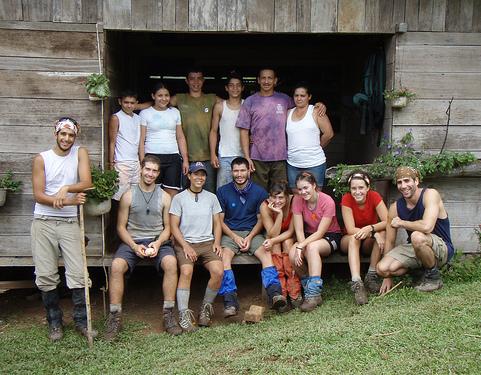Life comes with its ups and downs, but some cultures embrace the beauty of living to a greater extent than others. After reading the article entitled, “9 Characteristics of a Culture that Determine Happiness, Longevity and Quality of Life” by Silvia Mordini, we at Outward Bound Costa Rica were inspired to look at what makes our school a successful alternative classroom- one where students learn more than math and science. Here, students learn about the fundamentals of a healthy, happy and sustainable lifestyle.
Visitors tend to view “hospitality, generosity, and kindness as the staples of the [Costa Rican] culture.” Our tico instructors and homestays in the Costa Rican countryside facilitate guided exposure to the Costa Rican pura vida, and the characteristics that helped Costa Rica earn the number one slot on CNN’s Happy Planet Index. And, in an era where the pursuit of happiness is more readily available around the world than ever before in history, experts are taking a hard look at these general components of a happy life. Books like the Geography of Bliss and 5 Blue Zones explore various global cultures around the world, explaining the intricacies of those which boast the most happy people.

Mordini combines her happiness research with that of Dan Buettner’s, the author of the 5 Blue Zones, concluding that the following characteristics make a select few world cultures more conducive to happy living (taken directly from her article):
1. Natural Movement – The world’s longest living people don’t pump iron, run marathons or join gyms. Instead, they live in environments that constantly nudge them into moving without thinking about it.
2. Purpose – A multitude of studies have reported that knowing your sense of purpose is worth up to seven years of extra life expectancy. Furthermore, Patricia Boyle, a researcher at the Rush University Medical Center and part of “Rush Memory and Aging Project”, has identified that having a life purpose greatly reduces the risk of Alzheimer’s and other cognitive degenerative diseases.
3. Down Shift – Even people in the Blue Zones experience stress. What the world’s longest living people share are the routines that help reduce and cope with stress.
4. 80% Rule – “Hara hachi bu” is a 2500 year old Confucian mantra originated in Okinawa and said before meals that reminds people to stop eating when their stomachs are 80 percent full. The 20% gap between not being hungry and feeling full could be the difference between losing or gaining weight.
5. Plant Slant – Beans, including fava, black, soy and lentils, are the cornerstone of most centenarian diets. Meat, mostly pork, is eaten on average only five times per month.
6. Wine @ 5 – People in all Blue Zones (except Adventists) drink alcohol moderately and regularly. Moderate drinkers are said to outlive non-drinkers.
7. Belong – All but five of the 263 centenarians that were interviewed belonged to some faith-based community. Denomination didn’t seem to matter. Research shows that attending faith-based services four times per month adds an average of 4-14 years to one’s life expectancy.
8. Loved Ones First – Successful centenarians put their families first. This means keeping aging parents and grandparents nearby or in the home. They were also committed to a life partner, which can add up to 3 years to one’s life expectancy.
9. Right Tribe – The world’s longest living people chose or were born into social circles that supported healthy behaviors. Research from the Framingham Studies shows that smoking, obesity, happiness, and even loneliness are contagious. Thus, the people with highest life expectancy had health behaviors that were favorably shaped by their social networks.
Go to Mordini’s article to learn more on the topic. As the locals say, Pura Vida!